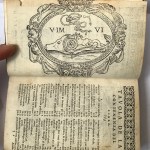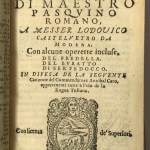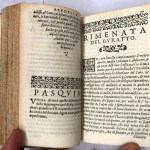ANDREW FLETCHER OF SALTOUN’S COPY
CARO, Annibale. Apologia de gli Academici di Banchi di Roma, contra messer Lodovico Castelvetro da Modena. In forma d’uno spaccio di maestro Pasquino, con alcune operette incluse, Del Predella, Del Buratto, Di ser Fedocco. … [with] CASTELVETRO, Ludovico, Ragione d’alcune cose segnate nella canzone d’Annibal Caro. Venite a l’ombra de gran gigli d’oro.
Parma, appresso Seth Viotto, 1573.
£950
8vo, two works in one volume, Roman and Italic letter, head- and tailpieces. 1) ff. (viii) 120, †8 A-P8. First word of title within headpiece, vignette of an unicorn confronting snakes, verso of t-p with large vertical device showing a flintlock for rifles and, above, a broken spear and a knotted rope with motto: “vim vi”. 2) †4A-Y8 Z4 (S2r blank, last three leaves of first quire † with the table of contents bound at the end of the book). Title page with large vignette of a unicorn fighting snakes (one bears wings) within elaborate border and the Farnese family motto: “virtus securitatem parit”, Fletcher’s autograph repeated; verso of t-p with Castelvetro’s device: an owl perched on top of a toppled urn with the Greek inscription “KEKPIKA”, “I have judged” (Tung, 1110). The image closely resembles the figure on the reverse of the Athenian “New Style” tetradrachm (on this, see Amaral, Jr., 388-390). In worn C19th calf over boards, spine richly gilt with lettering on red morocco label. Fresh and clean copies of two interesting second editions.
Annibale Caro (1507-66) was a man of letters who long served the Farnese, the rulers of Parma. In 1553, Cardinal Alessandro Farnese requested that he wrote a song in praise of the royal house of France, which was published with the title Venite all’ombra dei gran gigli d’oro (“Come to the shade of the great golden lilies”). The humanist Ludovico Castelvetro (1505-71), a sympathizer of the Reformation close to the heterodox circle of Modena, who later joined the Italian Protestants emigrated to Switzerland, soon opposed Caro’s song. This originated a twenty-year dispute, which involved aspects of the contemporary debates on language and literary models. Caro initially ignored Castelvetro’s criticism, publishing also a commentary on his song. However, Castelvetro reiterated his negative judgment in his Replica to the commentary and in other short texts, which caused Caro to publish his Apologia in 1558. This work was a violent polemic and attach to Castelvetro not only from a literary point of view, but also from a religious standpoint. Caro questioned the already dubious orthodoxy of his rival. Castelvetro replied in 1559 with his Ragioni. “Then Caro enlisted the support of Benedetto Varchi, who prepared a first draft of a response as early as 1560, but his dialogue, the Ercolano, remained unpublished until 1570. Varchi aimed at discussing broader issues of linguistic relevance, not at a mere refutation of Castelvetro’s arguments. But Castelvetro’s response, Correttione [1572], rejects Varchi’s position and indeed expands the controversy to include his handling of dramatic dialogue as a genre.” Encyclopedia of Italian Literary Studies: A-J, 2007, p. 406.
This copy has a notable provenance: it is from the library of the Scottish patriot Andrew Fletcher of Saltoun (1655-1716), with his distinctive “Fletcher” signature on both title pages.
EDIT16, n. C-1623 de C-2012. BMC 150 (second work only). Adams C-739 (Only the first work). Gamba, 276 e 1297, notes. Razzolini, p. 88. Cfr. Tiraboschi, Biblioteca Modenese (I, 440 et seq.) and Storia della Letterat. ital. (VII, 1695 et seq.)








